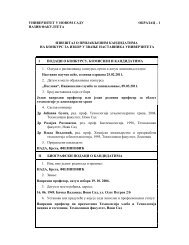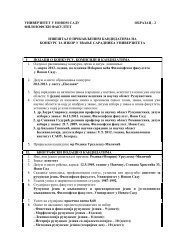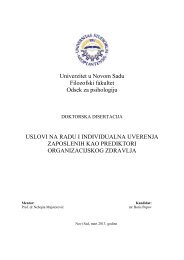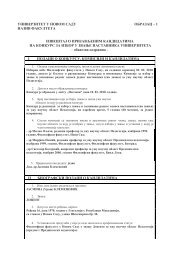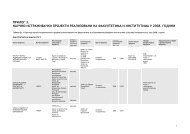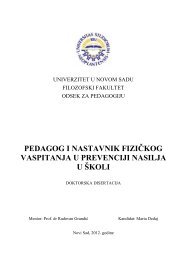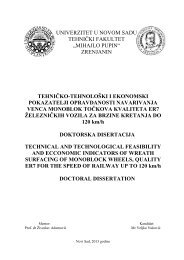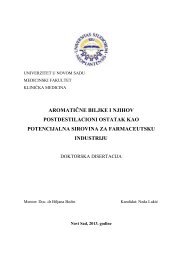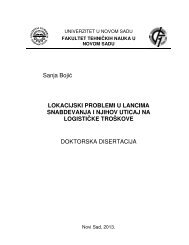Intercultural competence as an aspect of the communicative ...
Intercultural competence as an aspect of the communicative ...
Intercultural competence as an aspect of the communicative ...
You also want an ePaper? Increase the reach of your titles
YUMPU automatically turns print PDFs into web optimized ePapers that Google loves.
However, despite positive results that <strong>the</strong> study shows, <strong>the</strong> author stresses that IC<br />
learning must ‘receive explicit guid<strong>an</strong>ce <strong>an</strong>d training in various <strong>as</strong>pects <strong>of</strong> intercultural<br />
telecollaboration’ (O’Dowd 2004: 366). In particular, O’Dowd here refers to <strong>the</strong> depth <strong>of</strong><br />
research <strong>the</strong> students conducted, engagement with <strong>the</strong> t<strong>as</strong>ks, being able to <strong>as</strong>k effective<br />
questions, lack <strong>of</strong> reflection on received information. Mistaking exch<strong>an</strong>ge <strong>of</strong> information<br />
for exploring <strong>the</strong> contr<strong>as</strong>ting cultures is something noticed in <strong>an</strong>o<strong>the</strong>r study (Baker 2009)<br />
that explored ICC <strong>of</strong> English learners in Thail<strong>an</strong>d.<br />
The import<strong>an</strong>ce <strong>of</strong> this study is that it shows why including IC instruction in<br />
l<strong>an</strong>guage teaching is import<strong>an</strong>t, despite <strong>the</strong> voices that claim that learners would use<br />
English mostly <strong>as</strong> a lingua fr<strong>an</strong>ca or that <strong>the</strong>re c<strong>an</strong>not be <strong>an</strong>y affective value in IC<br />
teaching. O’Dowd stresses that learners have a predetermined <strong>an</strong>d usually stereotypical<br />
view <strong>of</strong> culture learning <strong>an</strong>d culture which usually me<strong>an</strong>s high culture <strong>as</strong> propagated from<br />
<strong>the</strong> media <strong>an</strong>d in textbooks. Therefore, awareness raising activities <strong>of</strong> different kinds<br />
should be included to ‘encourage learners to develop <strong>the</strong>ir critical cultural awareness <strong>an</strong>d<br />
to look for <strong>the</strong> values <strong>an</strong>d beliefs which underlie <strong>the</strong> facts <strong>an</strong>d behaviour’ (O’Dowd 2004:<br />
374).<br />
The author believes that, regarding <strong>the</strong> cultural dimension <strong>of</strong> FLT, IC learning at<br />
<strong>the</strong> tertiary level should be supported by both cultural studies <strong>an</strong>d ethnographic<br />
approaches, that is, both top-down <strong>an</strong>d bottom-up approaches so that learners gain insight<br />
into a culture on a wider scale, while also being aware <strong>of</strong> everyday culture.<br />
In a longitudinal study (2001-2004) <strong>the</strong> authors tired to <strong>as</strong>sess <strong>the</strong> effect that a<br />
four-year International Business Communication program at a university in <strong>the</strong><br />
Ne<strong>the</strong>rl<strong>an</strong>ds might have on students’ IC awareness <strong>an</strong>d FL acquisition. The authors<br />
designed a pre-test <strong>an</strong>d post-test <strong>as</strong> a me<strong>as</strong>urement instrument featuring everyday<br />
(monocultural <strong>an</strong>d intercultural) dialogues involving business <strong>as</strong>sociates. It w<strong>as</strong> used to<br />
<strong>as</strong>sess IC awareness in a group <strong>of</strong> 39 students (those who completed both pre- <strong>an</strong>d posttests).<br />
Students also did a self-<strong>as</strong>sessment <strong>of</strong> <strong>the</strong>ir interest in o<strong>the</strong>r cultures <strong>an</strong>d<br />
pr<strong>of</strong>iciency in a FL.<br />
As <strong>the</strong> instrument, <strong>the</strong> researchers used four scenarios (two monocultural <strong>an</strong>d two<br />
intercultural), b<strong>as</strong>ed on ‘<strong>the</strong> individualistic-collectivist perspective <strong>of</strong> culture <strong>an</strong>d with<br />
low-high context communication styles’ (Korzilius et al. 2007). The study should show<br />
whe<strong>the</strong>r over time <strong>the</strong> particip<strong>an</strong>ts would undergo <strong>an</strong> attitude shift <strong>an</strong>d consequently<br />
ch<strong>an</strong>ge <strong>the</strong>ir <strong>an</strong>swers. It w<strong>as</strong> expected that learners would develop IC awareness <strong>an</strong>d<br />
become more sensitive to a role cultural background could have in IC encounters. This<br />
121



